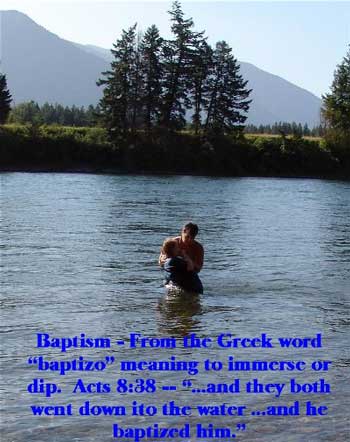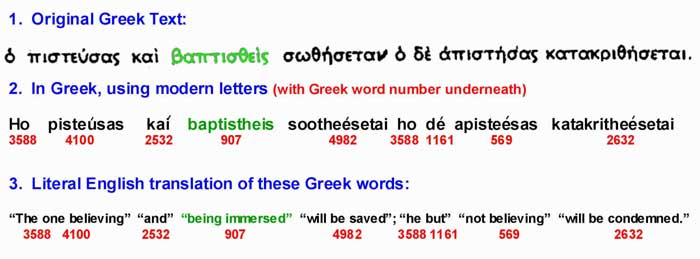Definitions:
 Baptism
Baptism
Baptism is a word derived from the Greek word "baptizo" which means to immerse or dip. It is said that the translators of the King James version of the Bible (1600 AD) chose to create a new English word "baptize" using the Greek letters "baptizo" instead of translating the word as "immerse" to avoid a conflict with the leaders of the Roman Catholic Church (some leaders of the Catholic church were teaching sprinkling instead of immersion).
When the New Testament letters were originally written, they were written in the Greek language. For example, in Mark 16:16, Jesus says: He who has believed and has been baptized shall be saved..." (NAS)
Following is how the original Greek words looked, and how they were translated:
Mark 16:16 says:

Translations include different variations of the word "baptism" as follows:
| Greek Word # | Word | Definition | Used In NT |
|
907 |
baptizo |
(verb) From a derivative of Greek word
#911; to make fully whelmed (i.e. fully wet); used only of ceremonial
ablution, espec. of the ordinance of Christian baptism.* To baptize, primarily a frequentative form of bapto, to dip, was used among the Greeks to signify the dyeing of a garment, or the drawing of water by dipping a vessel into another, etc. Plutarchus uses it of the drawing of wine by dipping the cup into the bowl (Alexis, 67) and Plata, metaphorically, of being overwhelmed with questions (Euthydemus, 277D).** |
Matt 3:6; Matt 3:11; Matt 3:11; Matt 3:13; Matt 3:14; Matt 3:16; Matt 28:19; Mark 1:4; Mark 1:5; Mark 1:8; Mark 1:9; Mark 6:14; Mark 6:24; Mark 7:4; Mark 10:38; Mark 10:39; Mark 16:16; Luke 3:7; Luke 3:12; Luke 3:16; Luke 3:21; Luke 7:29-30; Luke 11:38; Luke 12:50; John 1:25-28; John 1:31-33; John 3:22-23; John 3:26; John 4:1-2; John 10:40; Acts 1:5; Acts 2:38; Acts 2:41; Acts 8:12-13; Acts 8:16; Acts 8:36; Acts 8:38; Acts 9:18; Acts 10:47-48; Acts 11:16; Acts 16:15; Acts 16:33; Acts 18:8; Acts 19:3-5; Acts 22:16; Rom 6:3; 1 Cor 1:13-17; 1 Cor 10:2; 1 Cor 12:13; 1 Cor 15:29; Gal 3:27. |
|
908 |
baptisma |
(noun) baptism -- from the Greek word
#907.* Consisting of the process of immersion, submersion and emergence (from bapto, to dip), is used (a) of John's baptism, (b) of Christian baptism, (c) of the overwhelming afflictions and judgments to which the Lord voluntarily submitted on the Cross, e.g. Luke 12:50; and (d) of the sufferings His followers would experience, not of a vicarious character, but in fellowship with the sufferings of their Master.** |
Matt 3:7; Matt 21:25; Mark 1:4; Mark 10:38; Mark 10:39; Mark 11:30; Luke 3:3; Luke 7:29; Luke 12:50; Luke 20:4; Acts 1:22; Acts 10:37; Acts 13:24; Acts 18:25; Acts 19:3-4; Rom 6:4; Eph 4:5; 1 Pet 3:21. |
|
909 |
baptismos |
(noun) baptism or washing -- from the
Greek word #907.* As distinct from baptisma (the ordinance), is used of the ceremonial washing of articles, Mark 7:4, Mark 7:8, Hebrews 9:10, Hebrews 6:2.** |
Mark 7:4;, Col 2:12; Heb 6:2; Heb 9:10. |
|
910 |
Baptistes |
(noun) a baptizer -- as in John the
baptist -- from the Greek word #907.* Is only used of John the baptist, and only in the Synoptists.** |
Matt 3:1; Matt 11:11-12; Matt 14:2; Matt 14:8; Matt 16:14; Matt 17:13; Mark 6:25; Mark 8:28; Luke 7:20; Luke 7:33; Luke 9:19. |
|
911 |
bapto |
A primitive verb meaning to whelm (i.e. cover wholly with a fluid) or to dip. | Luke 16:24; John 13:26; Rev 19:13. |
* from Strong's Exhaustive Concordance of the Bible, Riverside Book and Bible House publishers.
** from Vine's Expository Dictionary of New Testament Words, unabridged edition, MacDonald Publishing Co.
Note: Press the back button on your browser to go back, or close this window or tab.